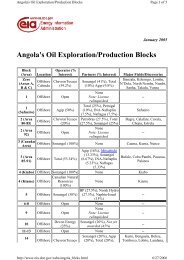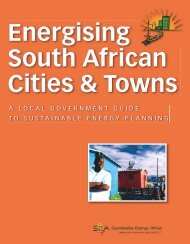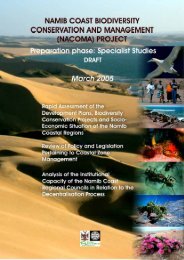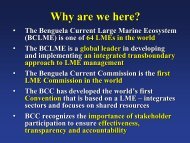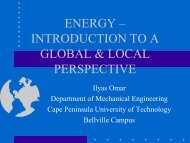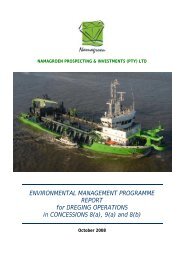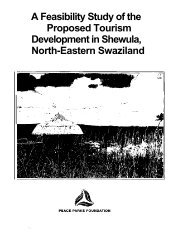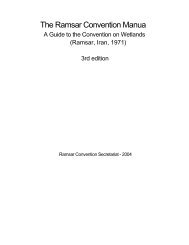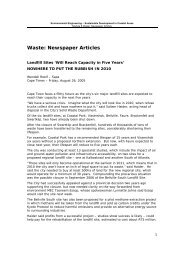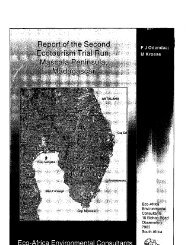Challenging the Aquaculture Industry on Sustainability-Greenpeace ...
Challenging the Aquaculture Industry on Sustainability-Greenpeace ...
Challenging the Aquaculture Industry on Sustainability-Greenpeace ...
Create successful ePaper yourself
Turn your PDF publications into a flip-book with our unique Google optimized e-Paper software.
image Mock up picture of salm<strong>on</strong>,<br />
which will be 37 times bigger than<br />
normal, when genetically engineered.<br />
©GREENPEACE / J NOVIS<br />
Any aquaculture that takes place needs to be sustainable and fair.<br />
For aquaculture systems to be sustainable, <str<strong>on</strong>g>the</str<strong>on</strong>g>y must not lead to<br />
natural systems being subject to degradati<strong>on</strong> caused by:<br />
1 an increase in c<strong>on</strong>centrati<strong>on</strong>s of naturally occurring substances,<br />
2 an increase in c<strong>on</strong>centrati<strong>on</strong>s of substances, produced by society,<br />
such as persistent chemicals and carb<strong>on</strong> dioxide and<br />
3 physical disturbance.<br />
In additi<strong>on</strong> people should not be subject to c<strong>on</strong>diti<strong>on</strong>s that<br />
systematically undermine <str<strong>on</strong>g>the</str<strong>on</strong>g>ir capacity to meet <str<strong>on</strong>g>the</str<strong>on</strong>g>ir basic needs for<br />
food, water and shelter.<br />
In practical terms, <str<strong>on</strong>g>the</str<strong>on</strong>g>se four c<strong>on</strong>diti<strong>on</strong>s can be translated into <str<strong>on</strong>g>the</str<strong>on</strong>g><br />
following recommendati<strong>on</strong>s:<br />
Use of Fishmeal, Fish oil and “Trash Fish”: To reduce <str<strong>on</strong>g>the</str<strong>on</strong>g><br />
pressure <strong>on</strong> stocks caught for fishmeal and fish oil, <str<strong>on</strong>g>the</str<strong>on</strong>g>re needs to be<br />
a c<strong>on</strong>tinued move towards sustainably produced plant-based feeds.<br />
Cultivating fish that are lower down <str<strong>on</strong>g>the</str<strong>on</strong>g> food chain (herbivores and<br />
omnivores ra<str<strong>on</strong>g>the</str<strong>on</strong>g>r than top predators) that can be fed <strong>on</strong> plant-based<br />
diets is key to achieving sustainable aquaculture practices. <str<strong>on</strong>g>Industry</str<strong>on</strong>g><br />
must expand its research and development <strong>on</strong> herbivorous and<br />
omnivorous fish which have str<strong>on</strong>g market potential and suitability<br />
for farming.<br />
In more general terms, <str<strong>on</strong>g>the</str<strong>on</strong>g>re is an urgent need for fisheries<br />
management to shift towards an ecosystem-based approach wherein<br />
a global network of fully protected marine reserves covering 40% of<br />
<str<strong>on</strong>g>the</str<strong>on</strong>g> oceans is established toge<str<strong>on</strong>g>the</str<strong>on</strong>g>r with sustainable fisheries<br />
management outside of <str<strong>on</strong>g>the</str<strong>on</strong>g> reserves 70 . This is key to achieving<br />
sustainable fisheries.<br />
<strong>Greenpeace</strong> c<strong>on</strong>siders <str<strong>on</strong>g>the</str<strong>on</strong>g> culture of species that require fishmeal or<br />
fish oil-based feeds derived from unsustainable fisheries and/or which<br />
yield c<strong>on</strong>versi<strong>on</strong> ratios of greater than <strong>on</strong>e (i.e. represent a net loss in<br />
fish protein yield) as unsustainable. Plant-based feeds should<br />
originate from sustainable agriculture, and sources of omega 3 should<br />
be algal derivatives, grape seed oils, etc.<br />
Nutrient Polluti<strong>on</strong> and Chemical Polluti<strong>on</strong>: To reduce nutrient<br />
wastes, <str<strong>on</strong>g>the</str<strong>on</strong>g>re is great potential for <str<strong>on</strong>g>the</str<strong>on</strong>g> development of integrated<br />
multi-trophic aquaculture (IMTA) systems, aquap<strong>on</strong>ics and integrated<br />
rice-fish culture.<br />
<strong>Greenpeace</strong> c<strong>on</strong>siders aquaculture that results in negative<br />
envir<strong>on</strong>mental impacts in terms of discharges/effluents to <str<strong>on</strong>g>the</str<strong>on</strong>g><br />
surrounding envir<strong>on</strong>ment as unsustainable.<br />
Escapes of Farmed Fish to <str<strong>on</strong>g>the</str<strong>on</strong>g> Wild: To overcome <str<strong>on</strong>g>the</str<strong>on</strong>g>se problems<br />
it has been suggested that enclosed bag nets/closed wall sea pens<br />
should be used to prevent fish from escaping, or that land-based<br />
tanks should be used 5 . Ultimately, land-based tanks are <str<strong>on</strong>g>the</str<strong>on</strong>g> <strong>on</strong>ly<br />
opti<strong>on</strong> if <str<strong>on</strong>g>the</str<strong>on</strong>g> goal is to eliminate any risk of escapes which might<br />
o<str<strong>on</strong>g>the</str<strong>on</strong>g>rwise occur as a result of hurricanes or o<str<strong>on</strong>g>the</str<strong>on</strong>g>r extreme wea<str<strong>on</strong>g>the</str<strong>on</strong>g>r<br />
events at sea. It is crucial to use native ra<str<strong>on</strong>g>the</str<strong>on</strong>g>r than exotic species 42 .<br />
<strong>Greenpeace</strong> recommends that <strong>on</strong>ly species which are native should<br />
be cultivated in open water systems, and <str<strong>on</strong>g>the</str<strong>on</strong>g>n <strong>on</strong>ly in bag nets,<br />
closed wall sea pens or equivalent closed systems. Cultivati<strong>on</strong> of n<strong>on</strong>native<br />
species should be restricted to land-based tanks.<br />
Protecti<strong>on</strong> of Local Habitat: Some aquaculture practices have had<br />
serious negative impacts <strong>on</strong> local habitat. <str<strong>on</strong>g>Aquaculture</str<strong>on</strong>g> practices must<br />
be set up in a way that provides for <str<strong>on</strong>g>the</str<strong>on</strong>g> protecti<strong>on</strong> of coastal<br />
ecosystems and local habitats. In additi<strong>on</strong>, no new aquaculture<br />
practices should be permitted in areas that are to be designated as<br />
marine reserves and any existing aquaculture operati<strong>on</strong>s within such<br />
areas should be phased out.<br />
<strong>Greenpeace</strong> c<strong>on</strong>siders aquaculture which causes negative effects to<br />
local wildlife (plants as well as animals) or represents a risk to local<br />
wild populati<strong>on</strong>s as unsustainable.<br />
Use of Wild Juveniles: The use of wild-caught juveniles to supply<br />
aquaculture practices, particularly some shrimp aquaculture, is<br />
destructive to marine ecosystems.<br />
<strong>Greenpeace</strong> c<strong>on</strong>siders aquaculture which relies <strong>on</strong> wild-caught<br />
juveniles as unsustainable.<br />
Transgenic Fish: The physical c<strong>on</strong>tainment of genetically engineered<br />
fish cannot be guaranteed under commercial c<strong>on</strong>diti<strong>on</strong>s and any<br />
escapes into <str<strong>on</strong>g>the</str<strong>on</strong>g> envir<strong>on</strong>ment could have devastating effects <strong>on</strong> wild<br />
fish populati<strong>on</strong>s and biodiversity 71 .<br />
<strong>Greenpeace</strong> demands that genetic engineering of fish for commercial<br />
purposes should be prohibited.<br />
Diseases: <strong>Greenpeace</strong> recommends cultivati<strong>on</strong> at stocking densities<br />
that minimise <str<strong>on</strong>g>the</str<strong>on</strong>g> risk of disease outbreaks and transmissi<strong>on</strong> and,<br />
<str<strong>on</strong>g>the</str<strong>on</strong>g>refore, minimise requirements for <str<strong>on</strong>g>the</str<strong>on</strong>g>rapeutic treatments.<br />
Resources: <strong>Greenpeace</strong> c<strong>on</strong>siders aquaculture that depletes local<br />
resources, for example, drinking water supplies and mangrove<br />
forests, as unsustainable.<br />
Human Health: <strong>Greenpeace</strong> c<strong>on</strong>siders aquaculture that threatens<br />
human health as unfair and unsustainable.<br />
Human Rights: <strong>Greenpeace</strong> c<strong>on</strong>siders aquaculture that does not<br />
support <str<strong>on</strong>g>the</str<strong>on</strong>g> l<strong>on</strong>g-term ec<strong>on</strong>omic and social well-being of local<br />
communities as unfair and unsustainable.<br />
<strong>Greenpeace</strong> Internati<strong>on</strong>al <str<strong>on</strong>g>Challenging</str<strong>on</strong>g> <str<strong>on</strong>g>the</str<strong>on</strong>g> <str<strong>on</strong>g>Aquaculture</str<strong>on</strong>g> <str<strong>on</strong>g>Industry</str<strong>on</strong>g> <strong>on</strong> <strong>Sustainability</strong> 19



